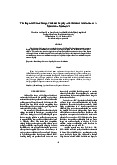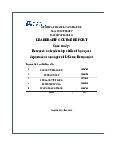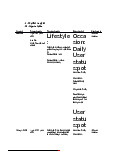




Preview text:
See discussions, stats, and author profiles for this publication at: https://www.researchgate.net/publication/333081526
CRM is more than just a digital technology! Article · May 2019 CITATIONS READS 3 912 1 author: Bijan Khosravani
Bergische Universität Wuppertal
2 PUBLICATIONS3 CITATIONS SEE PROFILE
Some of the authors of this publication are also working on these related projects:
Implementing CRM in SME View project
All content following this page was uploaded by Bijan Khosravani on 14 May 2019.
The user has requested enhancement of the downloaded file.
CRM is more than just a digital technology!1
Market conditions and competition
Those who are afraid to take up the economic challenge—and not least the politically conditioned—
of globalization and the digital era in the 21st century and/or underestimate it, they will not be able to
cope with the constantly growing global competitive pressure. New market conditions and/or
competitors and technologies open up not only the possibility of developing new business ideas and
concepts, but also force existing ones to be reviewed. These new concepts lead to new corporate
strategies, which in turn are reflected in new business processes and finally in new or modified
systems. A key feature of this economic political realignment is the so-called “global customer” of the
21st century. A customer who is well-informed and high demanding, while at the same time she/he is
able to operate optimally in the global market. To meet the demands of such customers requires a
customer-oriented way of thinking and acting. In this context, Customer Relationship Management
(CRM) is undisputedly the strategy of the future to improve the competitiveness of a company in highly
competitive national and global markets. This is why CRM is a key tool with which a company will be
able to meet and master these challenges.
Success and failure of CRM
Although there are impressive successes in the field of CRM, well-founded studies show that there are
also misunderstandings and failed implementations. According to a study by Merkle Group Inc. in the
USA in 2013, 63% of CRM initiatives failed in large companies and 73% in small and medium-sized enterprises (SMEs).
The hype topic CRM has been making rather negative headlines lately. One major criticism is the
recurrent failure of a disproportionate percentage of all CRM deployment projects. This is because
most companies / organizations, especially SMEs, do NOT see CRM as a comprehensive approach to
designing and utilizing relationships with customers and business partners, but most often just expect
immediate miracle effects from the mere installation of CRM software. The most common and typical
reasons for the failure of CRM projects are, on the one hand, that in the beginning of most CRM
projects, no clear objectives, strategies and success criteria are defined at the beginning. Another
factor is that the discussion involves very different stakeholders (mostly with a blockade attitude).
1 Author: Bijan Khosravani, MBA PgDip IBA, is an international management consultant and visiting lecturer. Email: info@bijankingly.com 1
CRM—a lot of catching up to do in German SMEs
As independent studies show, the German SMEs have a large deficit or a significant backlog in terms
of the use of modern CRM platform. A Capterra report published in 2018 shows that 71% of companies
surveyed manage their customers with manual tools. The study shows that only 23% of companies
manage their customer contacts with CRM software—see Figure 12. Figure 1:
Methods of managing customer contacts in German companies 3% 3% 23% 31% 10% 30% CRM Software
Manul Methods (e.g. pen and paper) Excel Table or Google Sheets
Email Client (e.g. Outlook or Gmail) Email Marketing Software Others
The study also shows that 64% of German companies are interested in CRM software. At this point it
is important to emphasize that, in our opinion and experience, "CRM is more than JUST a digital technology!"
Today, implementing CRM is much more than a technology initiative. Companies, especially SMEs, who
consider the use of a CRM technology (e.g. CRM software) and / or a better presence in the social
media, and the like, as an implementation of CRM, will demonstrably fail to achieve the main objectives
of CRM, especially ROI. The result is that their efforts are partially or not fulfilled. This is not because
today's technology does not meet modern requirements, but because organizations, especially SMEs,
fail to develop a sophisticated CRM strategy that includes a new customer-centric business strategy.
In this context, Forrester Research writes in its CRM report for 2009 that only 47% of CRM projects
fully met expectations. The statistical figures of recent years were no more promising.
2 Source: https://www.capterra.com.de/blog/256/crm-markt-deutschland-verbraucherstudie-2018, viewed on 30.05.2018. 2
bijankingly Management Consultants (BKC) has created a holistic, practical and sustainable view and
approach to customer relationship management called BKC’s CRM Hexagon© shown in Figure 2. Figure 2:
BKC has also developed a methodology (AREP4CRM©) based on its proven CRM experience and latest
insights into strategies, measures and practices that can help you to make your CRM initiative
successful, in its entirety. In other words, all areas related to CRM are taken into account. 3
AREP4CRM© – Check-Up Analysis
The BKC concept "AREP4CRM© (Advanced Rapid Evaluation Package for Customer Relationship
Management)“ aims at “as is” analysis after the sensitization phase of the top management and the
middle management through business workshop.
On the basis of professional and practice-proven questionnaires, business relationships of the
company (customers and business partners) and their information flows, relevant CRM processes, the
ICT (information and communications technology) landscape in the area of applications and system
technology will be collected. CRM users will also be asked specific questions about the implementation
of CRM. The recording and evaluation of the data of this analysis are carried out, evaluated and
weighted by the CRM experts. The resulting information is categorized in a SWOT analysis (Strengths
/ Weaknesses and Opportunities / Threats) and accompanied by a recommendation, e.g. presented in
the form of a TWOS matrix or a project proposal at a final presentation to the management. 4 View publication stats



